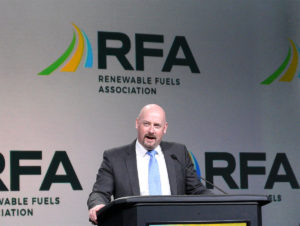 Renewable Fuels Association President and CEO Geoff Cooper is challenging the results of a new study out of the University of Wisconsin that claims corn ethanol is worse for the environment than gasoline.
Renewable Fuels Association President and CEO Geoff Cooper is challenging the results of a new study out of the University of Wisconsin that claims corn ethanol is worse for the environment than gasoline.
Seeking to set the record straight, Cooper said the report, which was funded in part by the National Wildlife Federation, is based on “a series of worst-case assumptions, cherry-picked data, and disparate results from previously debunked studies to create a completely fictional and erroneous account of the environmental impacts of the Renewable Fuel Standard.”
The claims in this report simply don’t align with reality and the facts on the ground, and the paper reads more like a fantasy novel than a genuine piece of academic literature. It should not be taken seriously.
In fact, when related research from some of the same authors was released several years ago, representatives from RFA and corn grower organizations met with this study’s lead author, Tyler Lark, at the University of Wisconsin, in an attempt to begin a constructive conversation about today’s ethanol industry and the real impacts of biofuels policy.
At that time, we shared data and information with Lark and his colleagues and asked how we could collaborate on research. We asked how we could work together to ensure their error-ridden satellite analysis of land-use changes was grounded in reality. We never heard back from them.
RFA is always open to having an honest, fact-based discussion about the impacts of ethanol and the RFS on the environment and economy. We have a great story to tell, and the data to back it up. Ethanol already reduced GHG emissions by roughly half compared to gasoline, and we are on a trajectory to achieve a net-zero emissions carbon footprint for ethanol by 2050 or sooner. Unfortunately, the authors appear more interested in slandering farmers and getting salacious headlines than examining the facts.

